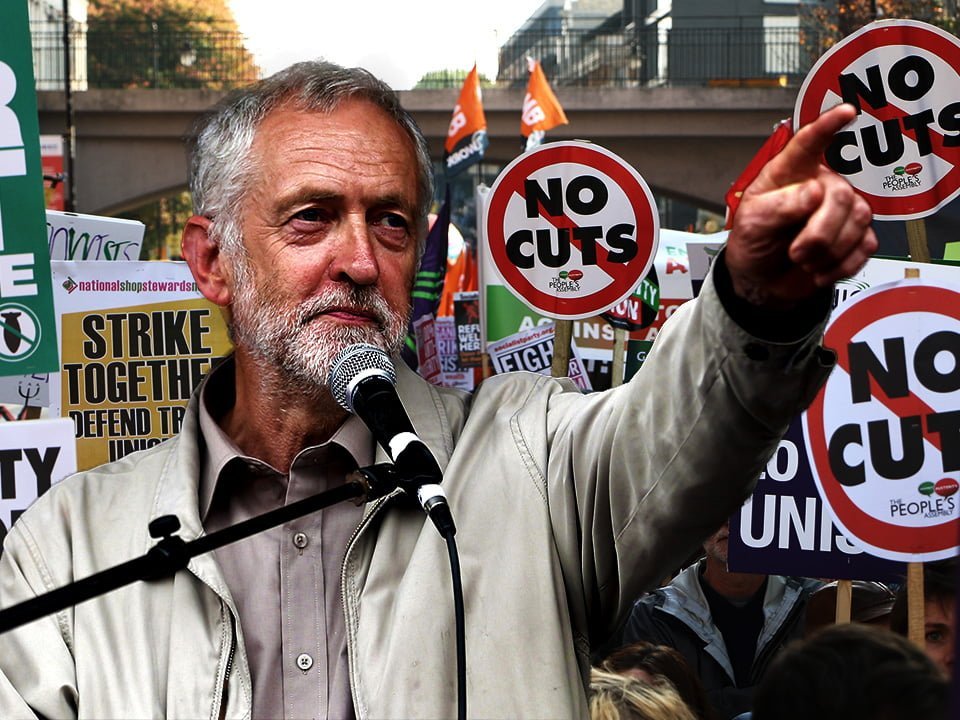After being initially denied membership of the Labour Party, two of Britain’s left-wing trade union leaders have been allowed to join the party this month. This is indicative of the shifting balance of power within the party, which is bolstering Corbyn’s position. Nevertheless, deep divisions in the party still remain.
After being initially denied membership of the Labour Party by the National Executive’s shadowy ‘Compliance Unit’, two of Britain’s left-wing trade union leaders have been allowed to join the party this month. This is indicative of the shifting balance of power within the party, which is bolstering Corbyn’s position. But the deep divisions in the party still remain, expressed by the ongoing sabotage of the party by the right wing within it. Corbyn must organise his supporters on the basis of bold socialist ideas if he is to defend the gains that are beginning to be made.
The surge of the Left
Mark Serwotka, general secretary of the PCS union, and Matt Wrack, general secretary of the Fire Brigades Union (FBU) were both admitted to the Labour Party last week, on Tuesday 1st March. Serwotka was expelled from the Labour Party 25 years ago and has been a consistently fierce critic of New Labour. The FBU, meanwhile, disaffiliated from the Labour Party in 2004 in protest against Blairite policy, but re-affiliated in November last year in order to support Corbyn.
The fact that these two leading figures from the trade unions have rejoined the Labour Party indicates a rallying around Corbyn and his anti-austerity politics by a broad layer on the Left. That the Compliance Unit was forced to allow them into the party illustrates the corresponding weakness of the Blairites and the bureaucracy.
After the frenzied purge of the party carried out by the National Executive Committee in the summer and autumn of last year, there has been a steady stream of left activists being readmitted to the party after appealing against the actions of the Compliance Unit. There is little appetite for expulsions amongst the party membership, who can see these manoeuvres for what they really are – factional warring by the right-wing designed to undermine Corbyn’s leadership. John McDonnell, the shadow chancellor, also helped push the pro-purge camp onto the back foot recently by calling for the total abolition of the Compliance Unit, on the grounds that it was denying legitimate applications for Labour membership.
All the recent signs indicate a strengthening of the Left around Corbyn inside the party. Simon Danczuk – the Daily Mail journalist, Labour MP and self-appointed ‘stalking horse’ to oust Corbyn as leader – is currently under suspension from the party, after heating up his hysterical anti-Labour campaign to the extent that it blew up in his face. Danczuk’s ignominious collapse amidst sleaze and scandal is an indication of the slightly cooled anti-Corbyn hysteria within the capitalist press.
The elections for the Young Labour national committee saw Left candidates take the majority of positions, and by-elections (both council and parliamentary) have almost invariably resulted in impressive victories for Labour. Sadiq Khan, the Labour candidate is leading the polls for the London mayoral elections and polls show that Corbyn’s personal approval rating remains high with Labour members and supporters.
All of this has taken the wind out of the sails of Corbyn’s critics inside the party. Thus at a meeting of the Parliamentary Labour Party (PLP) on 7th March, Corbyn faced down the more rabid and right-wing members, marshalling the support of a majority of MPs and shadow ministers and demanding an end to backbiting and sniping in the press. Compared to the PLP meetings of a few months ago, at which Corbyn was heckled and jeered at by Blairite MPs, it is clear that he has strengthened his authority and position within the party significantly.
The plots of the Right
However, the schism between Left and Right in the party has not disappeared and the right wing are still busy plotting Corbyn’s demise, albeit with a more sober-headed approach than they adopted during and immediately after the leadership election campaign. At present it seems that their strategy is to sabotage Labour’s chances in the London mayoral elections and the local elections in May. Jess Phillips, Labour MP for Birmingham Yardley, has said recently that Labour “absolutely cannot” win the next election.
In the same interview Phillips also rubbished the idea that Labour should defend socialist principles and explained that she is “utterly ambitious…ambitious for the sake of being so too”. When left-wing members of Labour are being accused of – and being expelled for – “not supporting the aims and values of the party”, it beggars belief that someone like Phillips is allowed to represent Labour in Parliament.
The right wing are hoping that, on the back of poor local and mayoral election results, they can oust Corbyn and replace him with a figure like Dan Jarvis, the MP for Barnsley Central, whose skill with meaningless and abstract phrases such as “radical realism” makes him attractive to the bland double-speaking careerists in the Parliamentary Labour Party. Figures such as Rachel Reeves, Caroline Flint and Stella Creasy are all also being built up through backroom briefings and collusion by a cabal of Blairites, who are in effect operating as a party within a party, trying to defy the democratic will of the Labour membership and remove Corbyn as leader at the first opportunity.
Winning the civil war
This sabotage must be fought – ignoring it will not make it go away. Corbyn cannot beat cloak and dagger intrigues by using the same tactics as his enemies. We cannot fight fire with fire – instead we should fight these careerist intrigues through mass organisation and action from the grassroots.
Momentum, the successor to Corbyn’s leadership campaign, has recently pledged to mobilise tens of thousands of people to secure a strong Labour performance in the May local elections and thereby defend Corbyn’s leadership. Jon Lansman from the national committee of Momentum has also stated that, were there to be a new leadership challenge, Momentum would use its considerable resources to campaign for Corbyn and see off any challengers.

The result of this display of strength is that the reality of the situation has now dawned on a number of right-wing PLP members: Corbyn still has the support of the majority of rank-and-file members, and any attempt to unseat him is likely to be met with the fierce resistance of the membership.
Corbyn’s biggest strength lies in his support amongst ordinary members and supporters of the Labour Party. Hundreds of thousands of workers and youth are enthused by his leadership because he does not behave, act, and speak like a “normal” politician: he sticks to his principles; he talks honestly; and he does not engage in maneuvers or politicking behind the scenes. Corbyn should be basing himself on these new, fresh layers that have been drawn into political activity, mobilising them in defence of the programme he was elected on, and organising his supporters on the basis of the radical socialist ideas that inspired people in the first place.
This means that an organisation like Momentum cannot confine itself to practical and organisational questions – it must also be a bold, dynamic organisation that debates socialist ideas and radical politics, bringing people into the party on that basis.
Corbyn and Momentum must organise the membership to defend the leadership against the coup-plotters in the PLP, calling for mandatory reselection of Labour MPs as a basic democratic right, in order to guarantee that Labour’s elected representatives reflect the interests and the politics of the working class people they are supposed to represent. This demand received a boost recently when Serwotka, in his first interview since re-joining the party, argued that no obstacles should be put in the way of local parties who want to deselect their MP.
In the final analysis, political strength comes from political ideas. That is why Corbyn won the Labour leadership election last year – he had something to say that chimed with the feelings of ordinary workers and youth, while the other candidates had nothing but vacuous soundbites. Corbyn should take advantage of the leftward shift in the balance of forces inside the party and build support for radical, socialist ideas. We need to inspire people with a vision of a better world, in which the economy is based on need, not profit; a society based on cooperation instead of exploitation. Corbyn, as leader of the Labour Party, has the ability to inspire people directly in this way. If he does, then his supporters will be willing to campaign and fight in these upcoming elections and beyond – not just to defend him and his programme, but to go further and make socialism a reality.






